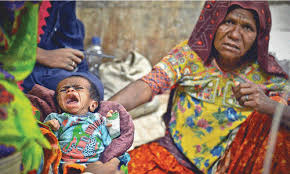By Dr.Abdul Razak Shaikh,
Tharparkar in Sindh is in the news mostly for wrong reasons. We get to know that children are dying of hunger or malnutrition, there is a drought-like condition most of the time, schools are closed, and hospitals are not functioning properly. On the other side, the PPP government in Sindh claims that the situation is not that serious, the news items concerning Thar are largely biased, the number of children dying there is highly exaggerated, and the health and school facilities are as good as in some other districts of Pakistan. Presently the Health Department has posted a lot of Doctors in every part of Thar having an excellent package of salary also.
Malnutrition is definitely there, Government and different NGO are working the issue seriously. The main cause of death among children is two-fold. One, the early marriages of teenage girls who are barely able to conceive a child and then bear the birth pangs. Two, because of malnutrition among mothers the embryo does not receive the required nutrients during the first eight weeks of pregnancy. When the embryo becomes a fetus in the ninth week of gestation it is already a week and unable to develop as a healthy organism.
The concept of anti-natal care is nothing in these poor areas; they prefer to deliver the baby by local Dias.
This has a lot to do with poverty and lack of livelihood opportunities. Previously the number of infants dying was much higher because of the distances and a lack of infrastructure. Now the roads in Tharparkar are much better than the roads in many other districts in Pakistan. This is mainly thanks to the efforts the government of Sindh has put in during the last ten years.
Since the government of Sindh is also the majority shareholder in the Thar Coal Mining Project, the requirements of the project have also prompted the government to fulfill its responsibilities. In addition to the government of Sindh, there are other non-governmental organizations. At the moment the Thar Foundation is at the forefront of this transformation. As a new player in the field, it has new blood in its veins and hired local educated youth to contribute to the development of this region. They have established a partnership with Indus Hospital, Karachi, to provide free healthcare to underprivileged people of the Thari society. They are already on the way to make Islamkot a model taluka (tehsil) for health facilities in Sindh, which can be followed by other districts. For example, their Marvi Mother and Child Clinic have been operational since 2015, and one could see Thari women and children get the best possible primary healthcare that is the hallmark of Indus Hospital in Karachi.
Islamkot is also going to be the location of a 250-bed hospital already underway in its earlier phase.
Though malnutrition was visible on their faces and poverty reflected in the nearby villages where they come from. The Thar Foundation claims that the multimillion-dollar Thar Coal Project employs almost 75 percent of its staff and workers from the area. Still, a major challenge is creating food security and eliminating or at least reducing malnutrition.
The Benazir Income Support Program (BISP) and the United Nations World Food Programme, Pakistan (WFP) supported by Australian Government, have launched an initiative to alleviate the food insecurity and associated vulnerabilities of 428,400 drought victims in Tharparkar district of Sindh Province.
As an immediate food consumption support, WFP will supplement BISP’s unconditional cash transfers with a humanitarian top-up of PKR 1,000 each for eligible households. A total of 63,000 poorest of poor families in Tharparkar will receive a humanitarian top-up alongside BISP’s UCT programmer’s routine monthly cash-transfer of RS 1650/- ,the partnership as Highly value, to address the growing issue of stunted growth and malnutrition in Pakistan, and also emphasized the initiative’s alignment with Federal Government priority list.
The people of Tharparkar live on agriculture, livestock and daily wages. Estimated 30 to 40 percent is dependent on agriculture and Cattle respectively. Agriculture is largely dependent on monsoon rainfall.
The Reverse Osmosis (RO) plants of water are not properly working and more than 50 percent are out of order. The government of Sindh pays more attention to the situation.
The Government of Sindh has decided to give 50-kilo wheat to each family every month.
The relief has been launched by the directive of Sindh Chief Minister and 208,247 families of Thar would be provided Wheat free of cost 50 kg each.
The team of Nutritional program Health department may send that area to Supply Nutritional Oil, Milk, Pulses and Sugar, the Program has sufficient amount of Budget available.
As this whole district has won by PPP in 2018 Election except Single MPA, their Members must visit frequently to area people and also support financial assistance to needed THARI. Maternal Neonatal and Child Health (MNCH) program are also working under the Health Department Government of Sindh they must be shifted to Thar and Whole efforts to be used for all families living very remote areas. Special attention must be towards the Neonatal care with all needful medicine and vaccination be provided by the government of Sindh. Counseling may arrange to local people to restrain from early marriages.

